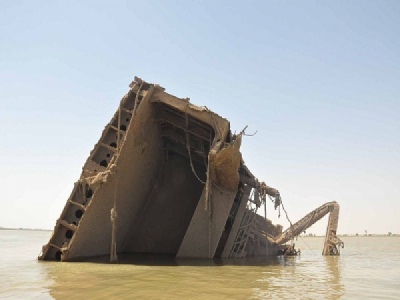
Posted on July 6, 2017
Dredging of Arvandroud river is contingent on salvaging boats and ships submerged during the Iran-Iraq war of the 1980s and this, according to general director of Khorramshahr Ports and Maritime Organization, Adel Daris, requires the cooperation of neighboring country Iraq.
The southern end of Arvandroud constitutes a natural border between Iran and Iraq, and based on the 1975 Algiers Agreement, both countries are responsible for dredging the waterway.
Since 1993, a total of 180 ships and boats have been salvaged from Arvandroud and Karun rivers, 55 from Arvand and 125 from Karun, a report released by the Ministry of Roads and Urban Development said.
Daris noted that the salvage of sunken boats has gathered momentum over the past years, adding that his organization has signed a deal with a domestic contractor for lifting 39 boats out of Arvandroud waters, of which 17 have been removed.
“Eighteen ships are estimated to be submerged in Iraqi waters, therefore, their salvage operation should be carried out in conjunction with Iraq,” he added.
Daris concluded that the dredging of Arvandroud is inevitable for Khorramshahr and Abadan to reclaim their past glory, as heavy transport vessels require a certain amount of water to float and not touch bottom and ensure their safe passage.
Dredging is the removal of sediments and debris from the bottom of lakes, rivers, harbors and other water bodies. It is a routine necessity in waterways around the world because sedimentation—the natural process of sand and silt washing downstream—gradually fills channels and harbors.
Source: Financial Tribune





